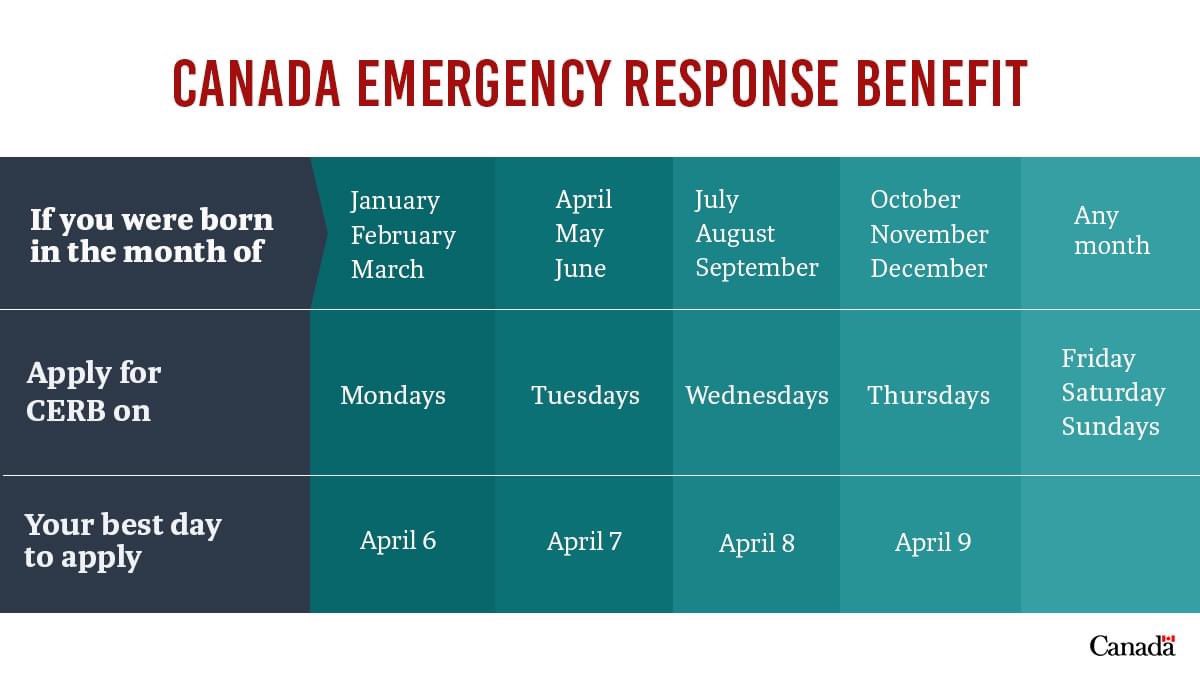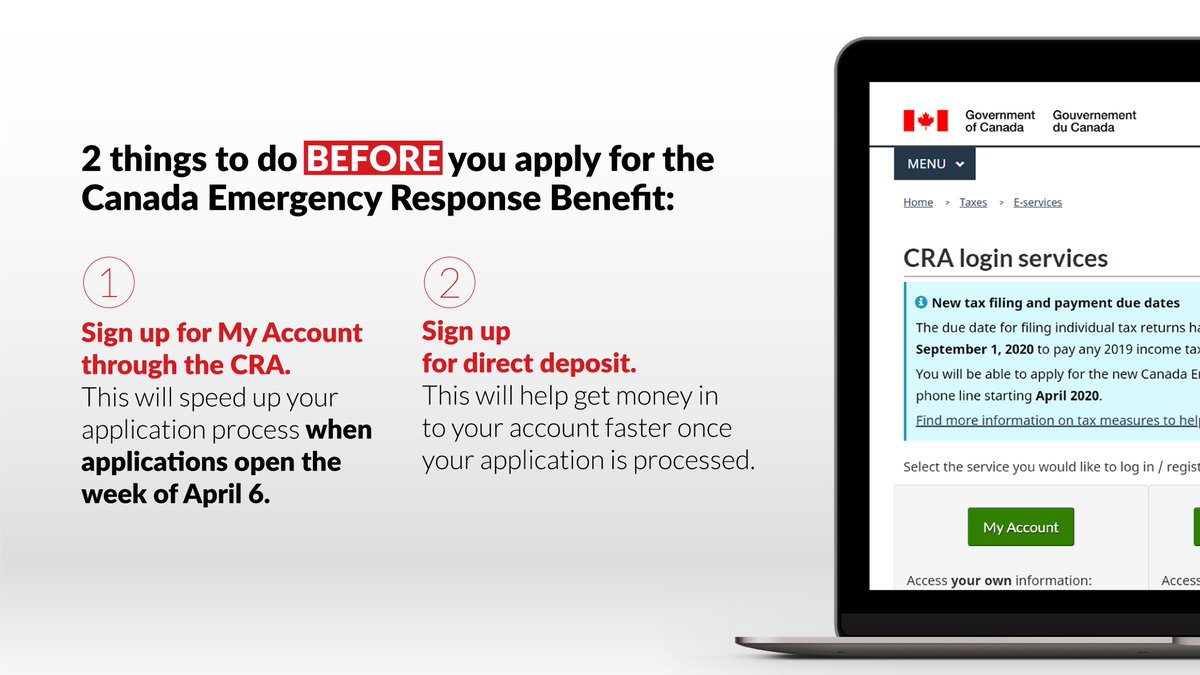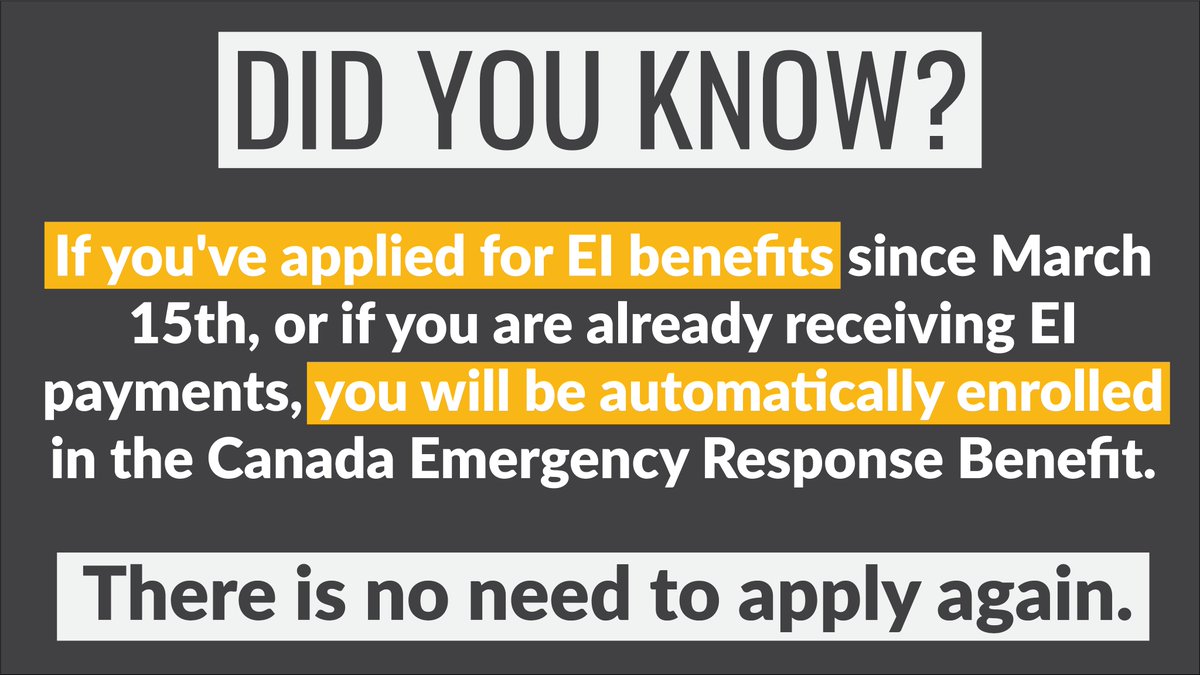
Canada COVID-19 benefits program portal opens today: Here’s how to apply
If applying by phone, Canadians can call the toll-free line at 1-800-959-2019
The federal government is launching an application portal on Monday where Canadians facing unemployment due to the COVID-19 crisis can apply for emergency income support benefits.
Canadians can go to Canada.ca for information about the Canada Emergency Response Benefit (CERB). Service Canada and Canada Revenue Agency are jointly administering the CERB.
Applicants who set up direct deposit are expected to receive a first payment within three to five days. Those who use mail should receive a first payment within 10 days. Payment is $2,000 a month for up to four months.
People can apply beginning at 6 a.m. ET on Monday.
People who are normally eligible for employment insurance (EI) can continue to apply through EI and Service Canada, and they will automatically be enrolled in CERB.
The CERB offers income support for people who have stopped working due to the pandemic, including those not eligible for EI, contract employees and freelancers.
To ensure the portal can handle the expected high volume of applications and the system is not overloaded, the government has staggered application periods over the work week based on an applicant’s month of birth. To find out when you should apply, see below:

Those born in January through March are asked to apply on April 6, the first day the web portal opens. People born in April through June are to apply April 7, those born in July through September on April 8, and Canadians with birth months October through December can sign up on April 9.
How can I apply?
There are two ways for Canadians to apply: online with CRA My Account or over the phone with an automated phone service. If applying online or by phone, Canadians will receive a payment by direct deposit or by cheque.
If applying online, Canadians will have to sign into CRA My Account. They should go to COVID-19: Canada Emergency Response Benefit in the alert banner at the top of the web page, select the period they want to apply for, declare that they qualify for the benefit and confirm the government has the right payment information.
If applying over the phone, Canadians can call the automated toll-free line at 1-800-959-2019. This is a dedicated line for CERB applications. Before people call, they should have their social insurance number and postal code handy to verify their identity.
Both of these services will be available 21 hours a day, seven days a week. Both services are closed from 3 a.m. to 6 a.m. ET for maintenance.
For more information, Canadians should go to canada.ca/en/revenue-agency/services/benefits/apply-for-cerb-with-cra.html#how
Applicants will need to confirm that they meet the eligibility criteria, and information that they provide during the application process may be verified later, the government said.
The benefit is available from March 15 to Oct. 3. The deadline for applications is Dec. 2.
The government said Canadians can prepare to apply for the CERB by signing on to CRA My Account. They should also make sure their direct deposit and mailing information is up to date with the CRA.
The best way to receive your payments as quickly as possible is to set up My Account on the CRA website. If you can, make sure to choose the direct deposit option. Further information is available here: https://bit.ly/3aKgKEy

Who is eligible?
To qualify for CERB, you must:
- Reside in Canada and be at least 15 years old.
- Have stopped working because of COVID-19.
- Have had income of at least $5,000 in 2019 or in the 12 months prior to the date of the application.
- Have been or expect to be without employment or self-employment income for at least 14 consecutive days in the initial four-week period. For subsequent benefit periods, you expect to have no employment income.
The benefit is also available to workers who, after March 15, are eligible for EI regular or sickness benefits.
The income of at least $5,000 may be from any or a combination of the following sources: employment; self-employment; maternity and parental benefits under the EI program and/or similar benefits paid in Quebec under the Québec Parental Insurance Plan.
“The benefit is only available to individuals who stopped work as a result of reasons related to COVID-19. If you have not stopped working because of COVID-19, you are not eligible for the benefit,” the government said in a backgrounder.
If you have already applied to EI since March 15th 2020, or you receive EI benefits currently, you don’t need to worry about applying again to CERB – you’ll be automatically enrolled.

Trudeau says Ottawa taking ‘unprecedented action’
Prime Minister Justin Trudeau said Sunday that the federal government has had to take extraordinary steps to help Canadians out of work due to the COVID-19 outbreak.
“We have taken unprecedented action to help thousands of Canadians who now suddenly find themselves through no fault of their own without an income,” Trudeau said.
“We want people right across the country to stay at home and not to work unless it’s absolutely essential. For that reason, we had to develop programs very quickly to help as many Canadians as possible,” he added.
COVID-19: Modelling suggests we’re in it for the long haul
Asked why Canadians should work when they could make more by collecting the CERB, he said: “We also recognize that, in some industries, some workers may be asking themselves that question, and that’s why we are working now to develop other ways to encourage people, who are providing essential work, to be able to continue that important work at this time.”
Trudeau acknowledged that the CERB will not help everyone, including students who weren’t working before the pandemic struck. Also, under the current program, people will not qualify if they are working reduced hours each week.
“We know that this is a situation where there isn’t a single measure that will work for everyone. But as we move forward, we hear these concerns, and we’re seeking solutions, and we will continue to work on them,” he said.
“We recognize that any time we’re doing big measures like this, there will be gaps.”
source: cbcnews
